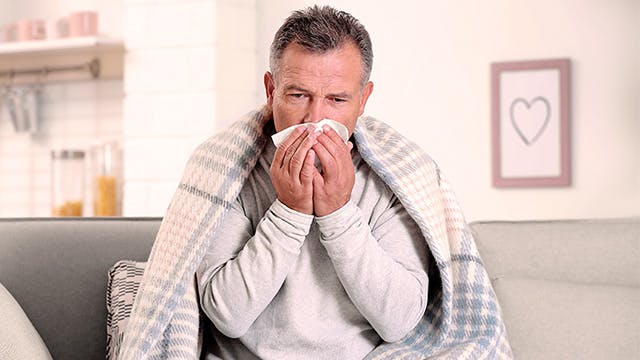How Are Colds and Flu Spread?
Colds and flu are most commonly spread through sneezing, coughing and touching contaminated surfaces.
- Air: Cold and flu viruses can travel up to six feet in airborne water droplets from a person’s breath when they talk, sneeze or cough. If you inhale one of these water droplets or it lands in your mouth, nose or eyes, you may become infected. Cold and flu viruses tend to spread more easily in cold, dry air.3
- Touch: Surprisingly, viruses can survive for some time on surfaces, especially on hard, smooth surfaces such as metal and plastic.4 Recent research suggests the flu virus can survive for up to nine hours on hard surfaces and up to four hours on porous items – such as clothes or soft toys.5 If you touch an infected surface – such as a door handle, light switch, computer keyboard, cup or glassware, clothing or tissues – a cold or flu virus can pass into your body if you touch your eyes, nose or mouth afterwards.2
- Close or Direct Contact: Kissing, hugging or shaking hands can pass the virus directly from one person to another.1
How Long is the Flu Contagious?
People with the flu are generally thought to be most contagious in the first three to four days after their illness begins. Adults may be able to infect others from one day before symptoms develop (when you may not even know you’re sick), and up to a week after getting the flu. However, young children or those with a weakened immune system may be contagious for longer than seven days.2
How Long is the Common Cold Contagious?
Like the flu virus, a cold can be contagious from a few days before you start showing symptoms until you fully recover (up to two weeks). You will usually be more contagious during the first two or three days, when your symptoms are likely to be at their worst.6

You will usually be more contagious during the first two or three days, when your symptoms are likely to be at their worst.6
Are Some People More at Risk of Getting Infected than Others?
Certain groups, such as the very young and the very old, those with compromised immune systems or long-term chronic conditions, are at higher risk of catching the virus than others.
How Can I Avoid the Cold or Flu Virus?
There are many easy ways you can help prevent becoming infected with a cold or flu virus:7
- Be sure to get your annual flu vaccination (this will not protect you against the common cold).
- Wash your hands often and for at least 20 seconds with soap and water – or hand sanitizer if soap isn’t available.
- Stay away from anyone who is sick. You’re more likely to contract a virus after close contact with a sick person.
- Disinfect hard surfaces that get a lot of people traffic. This includes door handles, light switches, shopping cart handles and gym equipment.
- Avoid touching your eyes, nose and mouth before washing or disinfecting your hands.
- Look after yourself. Getting a good amount of sleep, exercising regularly, and eating a balanced and nutritious diet will help to keep you healthy and reduce your risk of catching a cold or flu.
Wash your hands often and for at least 20 seconds with soap and water – or hand sanitizer if soap isn’t available.

How Long Do Cold and Flu Symptoms Last?
When suffering from cold and flu symptoms, how long you’ll feel unwell will vary from person to person. As a general rule, most people recover from the common cold within seven to ten days, while flu symptoms may last five to seven days.8 Although both cold and flu symptoms are incredibly similar, in general the flu is worse than the common cold and symptoms are more intense. Colds are usually more mild than the flu and don’t often result in serious health problems that lead to hospitalizations.10 Because flu symptoms can be more intense, flu vaccinations are strongly recommended in order to protect yourself and others from the flu. If you catch the flu while vaccinated, flu shots can minimize the effects of the flu. For people who have received the annual flu shot, the symptoms may last for a shorter amount of time or be less severe.8
When Can I Go Back to Work After the Flu or a Cold?
This will depend on how you feel, but you should wait until you are completely free of symptoms before returning to work – otherwise you will likely still be contagious and risk infecting others.6 It is also important to keep in mind that your body has to work hard to fight off the flu or a cold, which may leave you feeling fatigued after recovering. If you are feeling too fatigued to work, it is best that you stay home and get plenty of rest. Working while fatigued can make you less productive, and it can even be dangerous if your job consists of physical activity or heavy lifting. Recovery is an important step in fighting the flu or a cold, so it’s good to rest as much as you can.
If you absolutely must go back to work while recovering from the flu or a cold, you can wear a face mask to avoid spreading germs to your co-workers or anyone you may come in contact with at work. If working remotely is an option for you, ask your supervisor if it’s possible to work from home for the week.
Can I Exercise if I’ve Got a Cold or the Flu?
If you’re in doubt about whether or not you should keep exercising when you’re unwell, use the ‘above vs. below the neck’ rule.
While some mild to moderate exercise is generally okay while you’ve got ‘above the neck’ cold symptoms such as sneezing, a runny nose or a sore throat, it’s best not to do it at a gym where you might infect others. If you have ‘below the neck’ flu-like symptoms such as fever, chest congestion, cough, muscle aches or nausea, then you shouldn’t exercise at all until you have fully recovered.9
If you do choose to exercise when you’re feeling sick, try not to push yourself too hard. Tone down the exercise routines that you normally do or try out some light exercises that can be done from inside the house. Avoid working out in cold temperatures, as cold air can further irritate a sore throat or a cough. Be sure to stay hydrated by drinking plenty of water and liquids. If you start to feel unwell during a workout, listen to your body and stop exercising immediately.
If you want to be absolutely sure about whether or not you should be working out in your condition, check to see if you should exercise or rest based on your symptoms.
Next Steps
If you're feeling the early warning signs of the flu or a cold, you need to take action. Grab an over-the-counter cold and flu remedy from Theraflu such as Theraflu Multi-Symptom Severe Cold Hot Liquid Powder or Theraflu ExpressMax Severe Cold & Flu Syrup to treat symptoms such as nasal congestion, cough, body aches, headache, sore throat pain, chest congestion and fever.



